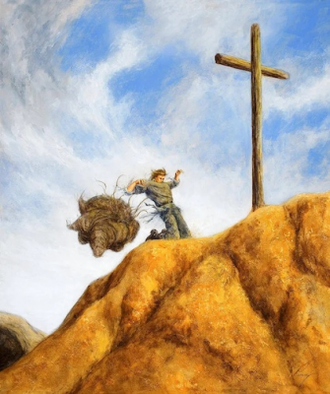Gospel in Art: To be forgiven, you must forgive

Unburdened, by Douglas Ramsey, 2015
Source: Christian Art
Gospel of 22 March 2022 - Matthew 18:21-35
Peter went up to Jesus and said, 'Lord, how often must I forgive my brother if he wrongs me? As often as seven times?' Jesus answered, 'Not seven, I tell you, but seventy-seven times.
'And so the kingdom of heaven may be compared to a king who decided to settle his accounts with his servants. When the reckoning began, they brought him a man who owed ten thousand talents; but he had no means of paying, so his master gave orders that he should be sold, together with his wife and children and all his possessions, to meet the debt. At this, the servant threw himself down at his master's feet. "Give me time" he said "and I will pay the whole sum." And the servant's master felt so sorry for him that he let him go and cancelled the debt. Now as this servant went out, he happened to meet a fellow servant who owed him one hundred denarii; and he seized him by the throat and began to throttle him. "Pay what you owe me" he said. His fellow servant fell at his feet and implored him, saying, "Give me time and I will pay you." But the other would not agree; on the contrary, he had him thrown into prison till he should pay the debt. His fellow servants were deeply distressed when they saw what had happened, and they went to their master and reported the whole affair to him. Then the master sent for him. "You wicked servant," he said "I cancelled all that debt of yours when you appealed to me. Were you not bound, then, to have pity on your fellow servant just as I had pity on you?" And in his anger the master handed him over to the torturers till he should pay all his debt. And that is how my heavenly Father will deal with you unless you each forgive your brother from your heart.'
Reflection on the Painting
Today's reading tells us that to be forgiven we must forgive our brothers and sisters. We unburden ourselves through forgiveness. Forgiveness has, perhaps, become a rather alien concept in Western society. If someone hurts us, we 'expect' an apology. They have to take the first step, and then we'll see. But we often forget how, when we forgive, we are unburdened of a lot of negative thoughts and feelings. Without forgiveness these negative feelings which started off as directed towards one person, soon extend into a larger web of negativity. By forgiving we shed negativity.
Our painting by Douglas Ramsey is a good illustration of how forgiveness unburdens us. We see a man running up a hill and falling on his knees at the foot of a cross. He feels the forgiveness coming from the cross, and the burden he has been carrying all this time becomes loose from his shoulders and now rolls off the top of the hill and into a valley, never to be seen anymore. The encounter with the cross has unburdened him.
So why do we find it so difficult to forgive? Much has to do with expectations. We expect others to behave in a certain way and when something happens that doesn't match our expectations, we get annoyed or even hurt. So maybe forgiveness may come a little easier if we realise that the other person, too, is also doing his or her best. We all get it wrong occasionally. The main thing is always to remember why we liked or loved the other person to begin with, and then re-focus on their good qualities. That way we won't even create a load of burdens that we need to shed, like the man in our painting.
LINKS
Today's story - https://christian.art/en/daily-gospel-reading/1120
Christian Art - www.christian.art


















